Israeli Priest Slams Anti-Israel Boycott Movement
Father Gabriel Naddaf’s “Spiritual Battle” Against BDS and for Christian Israeli Patriotism.
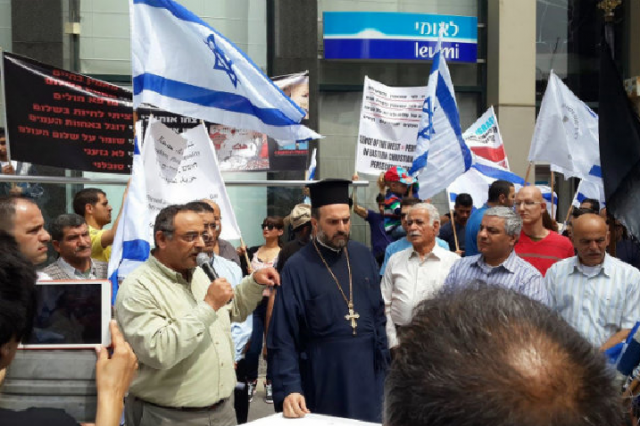
On July 16, Israel’s Christian Empowerment Council (CEC) released a short pamphlet titled Test The Spirits: A Christian Guide to the Anti-Israel Boycott Movement (BDS).
It’s authored by Father Gabriel Naddaf, a Greek Orthodox priest from Nazareth in the Galilee.
The new guide garnered some publicity in Israel.
But here in the U.S., other than a press release featured by JNS and a few other websites, it hasn’t received a lot of attention.
Spread the word about this terrific new resource.
Test The Spirits rejects the isolation and vilification of Israel under the banner of Christian values. It’s an unreserved and heartfelt vindication of the Jewish state and the Jewish people.
1. Father Naddaf’s “Truly Unique” Tool
The new guide is aimed to “help Christians better understand” the “true nature” of the anti-Israel boycott movement.
The CEC press release describes the 12 page booklet as “challenging Christian anti-Zionism on an ideological level”.
Basically, it’s an unapologetic, passionate, and vigorous defense of Israel grounded in the Christian faith.
The guide can be downloaded for free as a PDF file from the CEC website.
Currently available only in English, there are plans to make it available soon in multiple languages.
It’s meant to be read as a direct response to the “recent discussions concerning BDS in global churches, including the Mennonite Church, the Episcopalian Church, and the United Church of Christ”.
Previous LI posts have covered anti-Israel animus in America’s mainline Protestant churches, including last month’s divestment vote in the United Church of Christ (UCC). As we discussed, the UCC vote was driven by a vocal minority of anti-Israel activists within the church, and enabled by Jewish Voice for Peace.
JVP is an anti-Zionist purportedly Jewish group that provides critical cover in America’s churches by allowing those with anti-Israel agendas to falsely portray BDS as standing with the Jewish people.
Fr. Naddaf would have a thing or two to say to them about what it really means to stand with the Jewish people. But he doesn’t expect his guide to change the hearts or minds of any of these Israel-hating church activists.
The audiences he’s hoping to reach are well-meaning, but terribly uniformed, Christian church congregants who’re being fed a diet of “lies and propaganda” in “direct violation of the Word of God”.
2. Israel’s Christian Arameans
Fr. Gabriel Naddaf is the CEC’s Spiritual Leader, and Chairman of the Israeli Christian Recruitment Forum (ICRF) founded in 2012.
In Israel, he’s well known for his pioneering work integrating Israel’s Christian minority into Israeli society, and “openly and bravely” supporting young Christians looking to serve in Israel’s armed forces.
Fr. Naddaf self-identifies as Aramean, not Arab.
There are deep historical connections between Jews and Arameans.
Many Jewish prayers and blessings are in Aramaic. It was the lingua franca of the area that is today the Middle East from the 6th century BC until the Arab conquest. Even common modern Hebrew words (like aba and ima—father and mother) are derived from it.
Fr. Naddaf prefers to define Israel’s Arab Christians as Arab-speaking Israeli Christians.
It’s in recognition of the fact that the many Christian citizens of Israel are the descendants of people who predate Arab Muslims by centuries, and who “have lived here in Israel since the time of the Bible”.
This past September, Israel’s Interior Ministry made the distinction official.
Israel’s Christians are now considered an independent minority and can register as ethnic Arameans if they wish to do so.
It’s a historic moment for Israel’s Christians.
At 160,900 they comprise just under 2% of the country’s population. Arab Muslim Israelis number 1.6 million, currently one-fifth of Israel’s citizenry.
Capt. (res.) Shadi Khalloul, an ICRF spokesman who served in an IDF paratrooper brigade, said that:
We have existed in this region for thousands of years. We accepted Christianity, but then had Arabic forced upon us during the Arab conquest, just like Jews did. But we preserved our language in churches and other cultural settings. I refused to officially register my two-year-old son after his birth because the Interior Ministry wanted to register him as an Arab. Now I can happily register him as an Aramean.”
3. Father Naddaf Pressured, Family Attacked
Over the years, Fr. Naddaf’s love of country and “embrace of Zionism [and] Jewish sovereignty in Israel” has made him a pariah to some Arab Israelis who accuse him of being a traitor and a collaborator—“helping the enemy of the Palestinian people” and “dividing Arab society”.
This past April, an attack on Fr. Naddaf’s work published in Al-Monitor by Ahmed Melham, a Palestinian journalist based in Ramallah, is typical of the kind of flak he and his colleagues have to deal with. In it, an angry Melhem condemns the priest for trying to recruit young Christians into the “occupation’s army” and questions his and the Orthodox Patriarchate’s religious credentials.
Melham manages to find a disgruntled Israeli Druse who landed in jail for refusing military conscription, and uses him to bash Fr. Naddaf’s work.
Never mind that the Druse have the highest draft rate in Israel, and have long proudly served in elite IDF units, such as the “Herev” (Sword) Battalion, an infantry unit tasked with guarding Israel’s northern border.
Druze also serve in high-ranking military positions.
Today, according to recent government figures, there’s been a sharp increase in requests by Golan Druze for Israeli citizenship, as they come to realize that Israel offers them a brighter future than do any of its neighboring states.
Since founding ICRF, Fr. Naddaf and other priests and Christian leaders who support it have faced near constant harassment.
According to The Jerusalem Post, the intimidation has included furious tirades from Ministers of Knesset, including from controversial Arab Muslim MK Haneen Zoabi and Greek Orthodox MK Basel Ghattas.
The Jerusalem Patriarchate has also been pressured to disassociate itself from Fr. Naddaf. There’ve been death threats.
And in December 2013, Fr. Naddaf’s son was viciously assaulted and hospitalized.
Fr. Naddaf has been kicked off of the Orthodox Church Council and was barred for months from Nazareth’s Basilica of the Annunciation, one of Christendom’s most holy sites.
This past March, he accused leftist Israeli civil rights groups of working to undermine his efforts.
Fr. Naddaf also claims that Christian Israelis serving in the IDF are routinely hassled by their neighbors—and sometimes even their own families: “These soldiers are forced to change out of their IDF uniforms before returning to their hometowns, for fear that they may be harassed on their way home”.
Last week, he told the Jerusalem Post that so far this year a dozen Christian soldiers have been attacked by Arab Muslims.
Undaunted, Fr. Naddaf continues to work for greater Christian integration into the Israeli state, and to publically speak out for Israel and against her enemies.
This past fall, he even publically endorsed the controversial, and now shelved, Jewish-state bill which would’ve enshrined Israel’s status as the homeland of the Jewish people into law.
At the time, many critics viewed the proposed legislative initiative as liable to damage relations between the state and the Arab minority.
That wasn’t Fr. Naddaf’s view:
it is important to clarify in law to the citizens of the state, who may have forgotten this, to our neighbors, and to the entire world, that it is not worthwhile to err. The Jews have returned home and established their national state. They are no longer temporary residents in the Land of Israel…for Israel to define itself as Jewish would not pose any obstacle for members of minority groups to live in peace in the country”.
4. Christian Israeli IDF Volunteers
Since 2012, dozens of self-identifying Arab and Aramean Christian Israelis have heeded Fr. Naddaf’s call to volunteer for military service.
The IDF has helped by launching a new campaign to actively recruit them. Male and female Christian citizens now receive voluntary enlistment forms with detailed information about how to go about it and positions available, including combat.
According to news reports, over the last few years the average number of Christians enlisting in the IDF has surged from what used to be about 30 annually to nearly 100 per year today.
At their military swearing-in ceremonies they can choose to pledge an oath of allegiance on a Christian Bible.
And as Fr. Naddaf notes, “They have been embraced by their fellow soldiers, who regard them as comrades in arms, and not as strangers in their midst”.
His son Jubran voluntarily joined an elite IDF unit last December, “out of a sense of mission and belonging and the aspiration to contribute to his country Israel”.
Good looking kid, with his proud Dad:
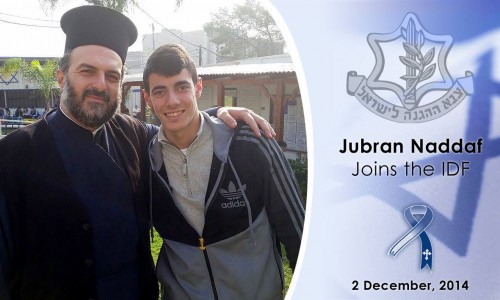
Test The Spirits is in many ways Fr. Naddaf’s latest effort to express his loyalty and gratitude to the state of Israel.
Like his many other writings and public talks, the booklet conveys his appreciation for Israeli citizenship, which gives him and other Israeli Christians a chance to “live full Christian lives in the Jewish state”.
5. Review of Test The Spirits
On Fr. Naddaf’s Facebook page he writes that “we hope that this booklet will help churches make the historic shift to stand with Israel and equip themselves with the truth”.
It’s part sermon and part modern history lesson.
The guide capably reviews Jordan and Egypt’s “doing nothing to build up” a Palestinian state from 1949-1967; Israel’s multiple offers of peace rebuffed; and the “cynical policies” of the Arab states, which unlike Israel “never absorbed” the Palestinian refugees as full citizens.
While ably conveyed, none of that is especially steeped in a religious perspective.
What’s unique here is how Hebrew and Christian scriptures are invoked to “encourage Christians across the world to think about Israel in Biblical and moral ways”.
A. Preface
In the guide’s preface, Fr. Naddaf calls on readers to pursue God’s will, guidance, and wisdom, and “to read the Bible before making dramatic decisions which could affect the spiritual life and the lives of others”.
He writes:
Dear brothers and sisters,
It takes great wisdom to understand the heart of God, and the matters closest to him. God teaches us in his Word that Israel is the apple of his eye (Zechariah 2:8).
Yet there is much confusion in the global church about Israel, and God is not the author of confusion (1 Corinthians 14:33). Rather, God wants us to seek after his heart; to get wisdom and to get understanding (Proverbs 4:5).
God does not want his church to be ignorant about such an important topic as Israel, yet there are many in the church today sowing confusion, spreading hatred of the Jewish state.
We learn from James that if anyone lacks wisdom, let him ask God, who gives generously to all without reproach, and it will be given to him (James 1:5)…
I pray God will guide you in great wisdom.
Blessings in Jesus Christ,
Father Gabriel Naddaf”.
B. Central Themes
The guide is essentially Fr. Naddaf’s “stand for the truth” accomplished via a series of responses to 10 questions:
- Have you prayed for the peace of Jerusalem?
- What does it mean to boycott Israel?
- Can the Bible guide our decision-making process towards the Jewish people, in matters of trade and money?
- How does a boycott of Israel impact the church?
- Can we stop the cycle of violence in the Middle East by boycotts?
- Does the Bible encourage boycotting nations?
- Does the Bible encourage boycotting nations in unique political situations?
- What is Zionism?
- How can I understand the history of Israel in the Middle East?
- Why is Gaza in such a bad way?
Three central themes emerge:
- Boycotting Israel “violate[s] the idea of a global body of Christ, without distinction between believers (Galatians 3:28)”.
- The Bible doesn’t encourage the boycotting of nations, even those which maintain a “military presence in a disputed territory” or those that are “prone to great sin”.
- Punishing Israel for seeking to protect the lives of its citizens is “perverse and un-Biblical”.
He writes:
So for the global body of Christ to boycott Israel, would also mean they would boycott a part of the body of Christ here in Israel. This is un-Biblical and unjust. We as Christians must abstain from even the appearance of evil (1Thessalonians 5:22)”.
And he reminds readers that the “Gospels of Jesus sets Jesus’ life in a political context where another nation—Rome—has control over Judea and Samaria, and does not advocate a boycott of Rome at all”.
The deadly plight of the Middle East’s Christians is recorded throughout the text:
- “In Iraq of 2003 there were 1.5 million Christians, today there are only 250,000”;
- “In Syria of 2012 there were 1.75 million Christians, of which 450,000 have already left, and the rate of ethnic cleansing is climbing”;
- “In Iran, house churches are routinely closed down and pastors are put in prison”;
- “Muslims who choose to convert to Christianity in Saudi Arabia face a death penalty”.
Fr. Naddaf implores his readers to make the crushing of Christianity in the Middle East their priority.
He notes the absurdity of Western churches considering a boycott of Israel, “a democracy where Christians are safe”, when they would “never consider boycotting despotic regimes where Christians are persecuted”.
The guide also lets readers in on a dirty little secret that BDS church activists try hard to keep under wraps: Christians are also being persecuted and demoralized under Hamas and Palestinian Authority rule.
In Gaza, “Christian shops and schools in Gaza have been firebombed” and there’s a “climate of intimidation and fear for Palestinian Christians”.
Since Hamas’ takeover of the enclave in 2007 half the Christian community has left. Forced conversions are reportedly also taking place.
In the West Bank, Fr. Naddaf writes of land and homes being confiscated, and churches and holy places attacked and desecrated. He notes that “By the end of the first decade of PA rule, the number of Bethlehem’s Christians had dwindled by two-thirds”.
Overall, recent reports document that the West Bank is hemorrhaging Christians. Once 15% of the population, they now make up less than 2%.
It’s a reality that virulently anti-Israel Palestinian Christian organizations—like Sabeel, Christ at the Checkpoint (CaTC), Holy Land Trust (HLT) and the Bethlehem Bible College (BBC)—don’t want American Christians to know anything about.
The guide encourages reflection on the “moral danger” of bringing “equivalence between Israel’s defensive attitudes and the murderous terrorism of the groups seeking to destroy Israel”.
Remarking that Hamas could have built Gaza into a thriving “city-state”, using a model like “Singapore” or Hong Kong, Fr. Naddaf denounces it for allowing the Strip to become a “breeding ground for Islamist fanatics”.
Few politicians are mentioned in the text.
But names are given to the murdered innocents: Christian pastor Rami Ayyad who was killed by Hamas, and the four-year-old Jewish child Daniel Tregerman, killed this past summer “as he was running to a bomb shelter”.
C. A Shared Fate in the Jewish State
A central goal of the guide is to help Christians around the world to understand that “Jewish Israel has been a responsible steward for its Christians”.
Fr. Naddaf is well aware that Israel “is not perfect” and that serious challenges to integration remain.
Last month’s ugly and explicitly religious arson attack on the beloved Church of the Multiplication at Tabgha, on the shore of the Sea of Galilee, is a reminder that Israeli Christians continue to encounter intolerance.
The Tabgha vandalism drew fierce condemnation across the political spectrum, and an immediate investigation was launched.
Last week, Israel’s Shin Bet announced that several suspects had been arrested.
Sporadic violence against Christians by fringe Jewish religious extremists needs to be addressed by religious leaders and educators.
But it also needs to be put into perspective.
As Fr. Naddaf notes in the guide, in marked contrast to elsewhere in the region, Israel isn’t a place where hatred of Christians is ignored by the authorities or actively encouraged.
The reality is that Christians are prominent in all aspects of Israeli life. The group has included an acclaimed prize-winning author (the late Emile Habibi) and a Supreme Court Justice (Salim Joubran). And Christian Israelis have long been at the top of the country’s scholastic achievement charts.
Israel also guarantees access to all Christian holy places, which are under the exclusive authority of the country’s Christian clergy.
For Ramona Tausz, an American Christian college student from Hillsdale, Michigan who’s visiting Israel for this first time this summer, it’s a “blessing that ought never be taken for granted”. Read here her moving account of the “simple joy” of praying freely last week at Jerusalem’s Church of the Holy Sepulchre.
D. Reading Test The Spirits as a Jew
Fr. Naddaf writes that his guide is meant to help Christian readers become more “sensitive to God’s word”.
It calls on Christians to:
focus their energy on combatting the poisonous ideology and practices of terror groups, and bless rather than curse the world’s only Jewish state, which is a healthy democracy that enshrines the rights of all its citizens and strives to protect and defend them, to the benefit of the entire world”.
The guide isn’t really meant to be for Jews.
But there’s a lot that Jewish readers will find pleasantly familiar.
Fr. Naddaf writes with unwavering conviction that “Israel is the nation-state of the Jewish people…a nation since the days of Abraham, when God promised to make a nation from Abraham’s descendants…‘Israel’ refers to the Jewish nation throughout the Bible”.
I was delighted to find references to Abraham in the Pentateuch’s Genesis (Bereshith), to passages from Jeremiah in the Haftaroth, and even to the Book of Esther (Megillath Esther) where “Haman’s wicked plan to annihilate the Jewish nation…[was] accompanied by a desire to deprive the Jews of their material goods”.
These passages in the guide reflect not only Fr. Naddaf’s deep grasp of Jewish history. They also signal his profound appreciation of Jewish peoplehood, and of the bond that binds the Land to the Jewish nation, and the Land and the Jewish nation to God.
6. A Statement to LI from Father Naddaf
I contacted the CEC’s Media Director, Tal. E. Ben-Shlomo, to find out more about what the organization hopes to achieve with the publication of “Test The Spirits” and how it envisions the guide being used to stem the anti-Israel animus now increasingly prevalent within many mainline U.S. Protestant churches.
Here is Father Gabriel Naddaf’s reply:
Many Christians today do not associate modern Israel in an historic context. The Bible is not just the Word of God, it is a history book which tells the story of the People of Israel, the ancestors of today’s Jewish people who live in the State of Israel. I would hope that “Test the Spirits” would be a spring board for Christians to study the Scriptures and at the very least, make this vital connection. Standing up against the BDS movement is not in essence a political response; it is taking part in a spiritual battle, it is fighting for God’s people and His Land. I hope that the publication will give Christians an incentive and the tools to see that they are commissioned to stand up for Israel, because this is what God has clearly determined in His Word.
Community is a very dynamic and biblical principle. Within the new guide there are multiple subjects for groups to meet and study together. It may not be comfortable for some Christians, who until today, have never been taught that God still is in covenant with Israel, but a group meeting together can hone each other and help each other think through the implications outlined in the guide. The study guide serves not just as a tool to combat BDS but also an introduction to crucial theology: if we as Christians are happy to take the blessings as the descendants of Abraham, then we have to acknowledge the second part of that eternal blessing—a land given to the Jewish people as a sign of the eternal covenant. To take such a stance is not “politically correct”, but I take my strength from my Lord Jesus who was fearless and compassionate and was never concerned about what others thought of Him”.
7. Conclusion
Just as 800,000 Jews were once forced to flee Arab lands—in what’s known as the Jewish nakba—so too Christians today are being brutally expelled from countries that they’ve inhabited for centuries.
An important essay titled “Is This the End of Christianity in the Middle East?”, published this week in The New York Times Magazine, describes the harrowing experiences of Rana and her family, Christians from Qaraqosh—the largest Christian city in Iraq.
It’s a heartbreaking tale of murder, kidnapping, extortion, theft, rape, forced conversion, enslavement, torture, and exile at the hands of radical Islamist extremists and the governments that indulge them.
It’s now a decade-old story of religious persecution and vanishing Christian communities that’s being faithfully exposed by organizations like the Philos Project (see here and here). Joining other groups, such as The Cradle Fund, it’s now assessing ways that the American church can help to secure the survival of Christianity in the region of its birth—before it’s too late.
For now, the only place in the Middle East where Christians aren’t in danger but are instead flourishing is Israel.
Israel’s Christians aren’t being killed, their female believers aren’t being raped, and they can openly practice their religion.
They’re the last free Christians in the Holy Land.
Prompted in part by the suffering of Christians in other parts of the region, Israel is experiencing a “Christian Awakening”—a controversial grassroots movement that wants to cooperate more closely with Israeli Jewish society.
Leading the movement is long-time Israeli patriot Father Gabriel Naddaf, who loves and respects his country, and wants to fight for it. Now Fr. Naddaf is stepping up to defend the Jewish state against the anti-Israel boycott movement and its global crusade of hate.
It’s an important reminder of today’s “ultimate irony”: some of the Jewish people’s most ardent friends in the world are those who are most committed to their Christian faith.
——————————-
Miriam F. Elman is an associate professor of political science at the Maxwell School of Citizenship & Public Affairs at Syracuse University. She teaches and writes on international relations, the Middle East, Israeli politics & society, and the nexus between religion & politics
 DONATE
DONATE
Donations tax deductible
to the full extent allowed by law.

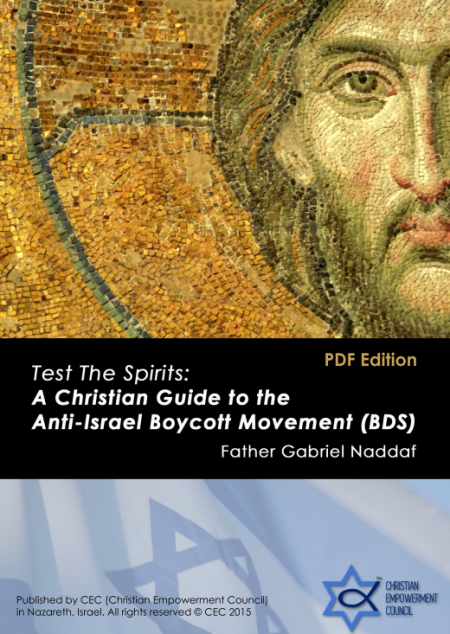
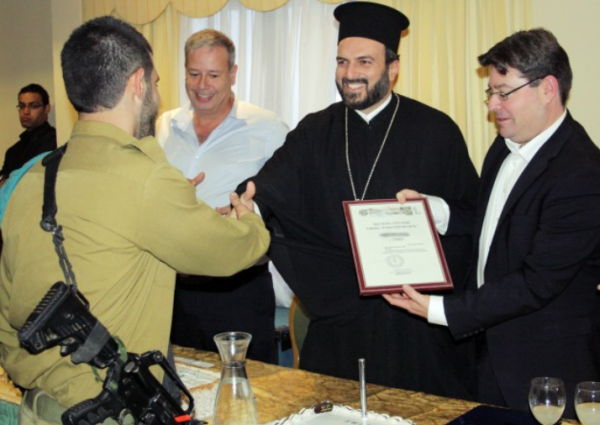
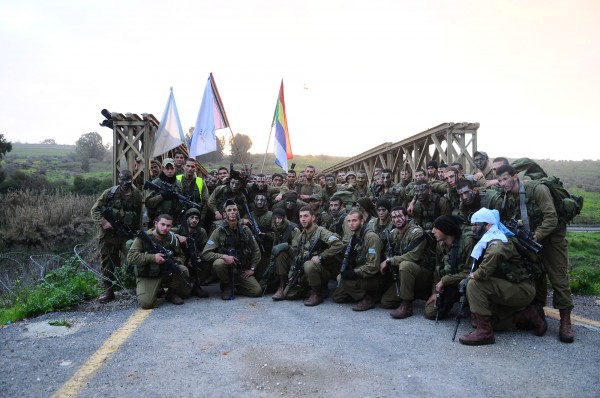
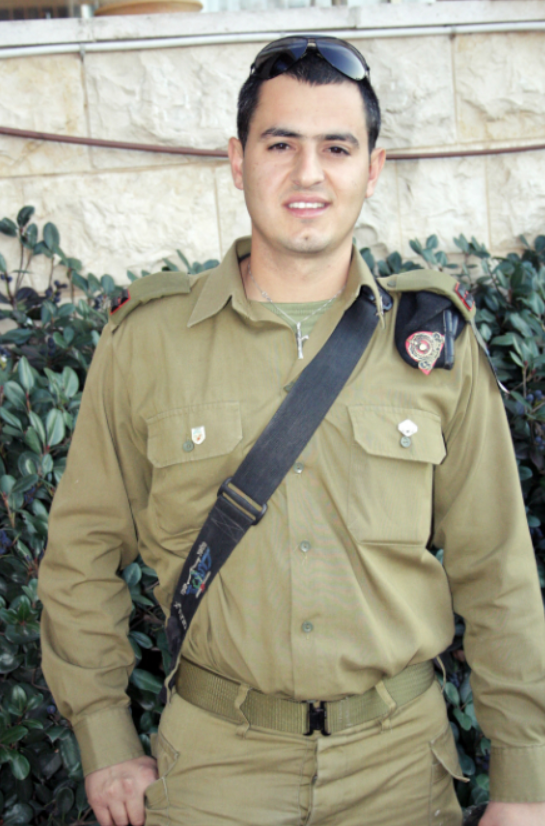

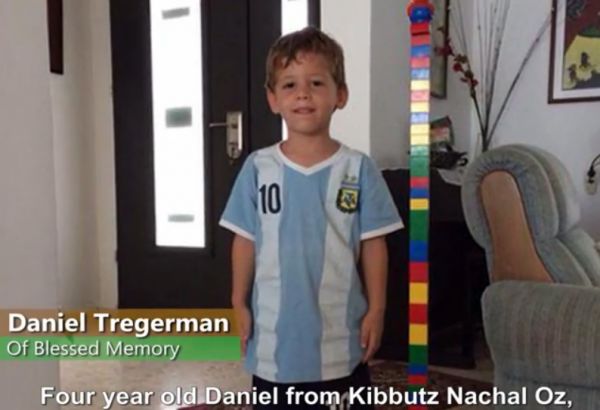








Comments
God bless Father Gabriel Naddaf and the CEC.
Great article, Miriam. I’m gonna pass the link on to my friends.
You wrote this: “I was delighted to find references to Abraham in the Pentateuch’s Genesis (Bereshith), to passages from Jeremiah in the Haftaroth, and even to the Book of Esther (Megillath Esther) where “Haman’s wicked plan to annihilate the Jewish nation…[was] accompanied by a desire to deprive the Jews of their material goods”.
Sometimes I wonder about the Jewish perspective on Christianity. References to and readings from the TNK are part of every church’s service on Sundays. The New Testament of Christianity stands solid and four square on the TNK. We cannot explain our faith without it. Christ Jesus Himself tells us the TNK speaks of Him.
If ever you find a Christian church that has tossed aside the TNK, call them out. Why? They neither know their head noir have a foundation.